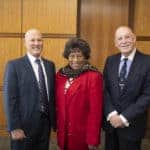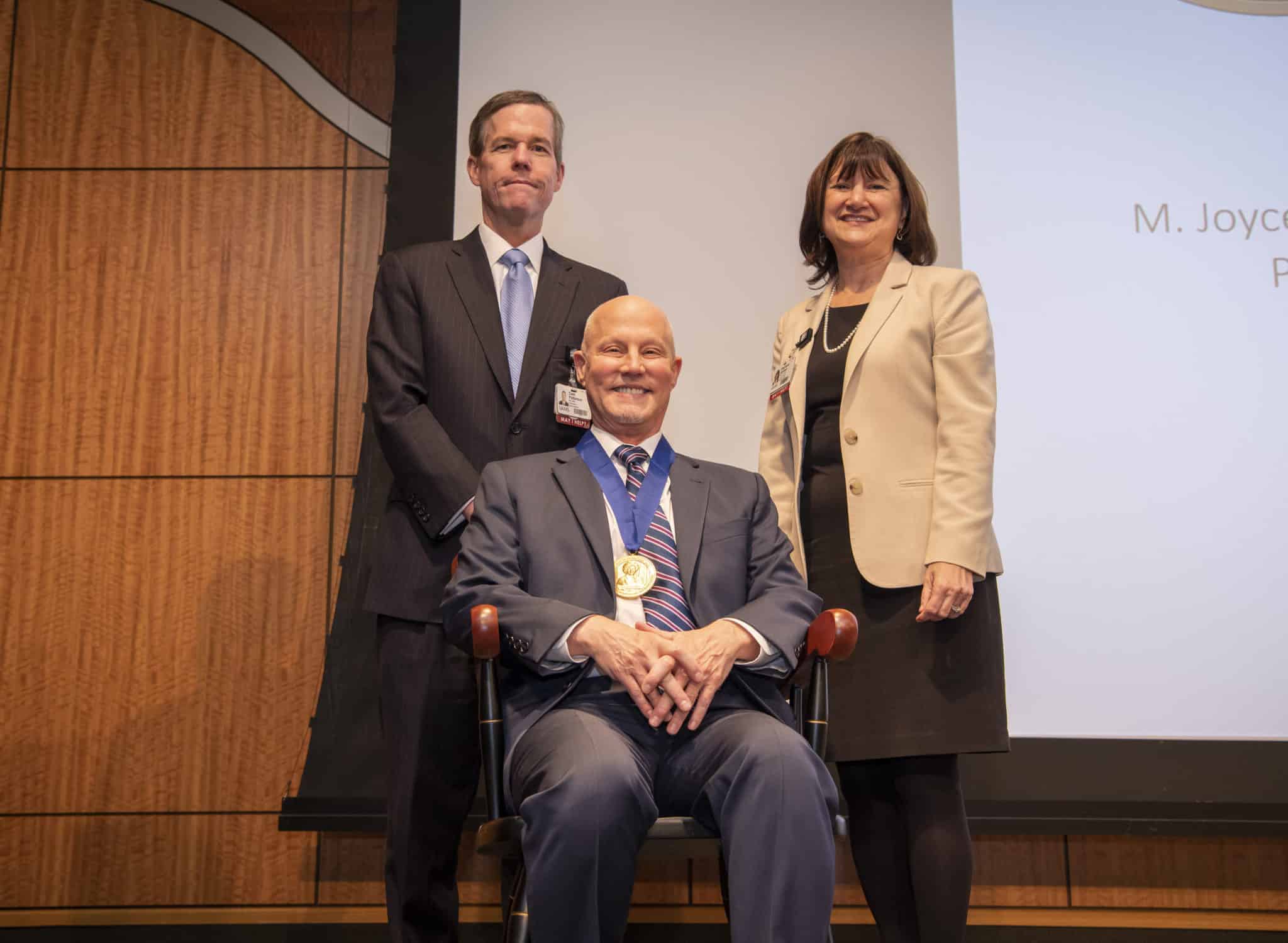Mark Williams, Ph.D., Invested in M. Joycelyn Elders, M.D., Chair in Health Promotion and Disease Prevention
| Mark Williams, Ph.D., dean of the Fay W. Boozman College of Public Health at the University of Arkansas for Medical Sciences (UAMS), was invested Feb. 20 in the M. Joycelyn Elders, M.D. Chair in Health Promotion and Disease Prevention.
Williams, whose career in public health spans over 30 years, was one of the first to study the epidemiology and prevention of HIV in drug users and was an original contributor to the development of community-based prevention interventions with this population. He joined UAMS in July.
“This is an honor for me,” said Williams. “I would like to welcome Dr. Elders. It is a great honor to have Dr. Elders here today, she has been a hero of mine ever since she served in President Clinton’s administration.”
An endowed chair is among the highest academic honors a university can bestow on a faculty member and is established with gifts of at least $1 million, which are invested and the proceeds used to support the educational, research and clinical activities of the chair holder. Those named to a chair are among the most highly regarded scientists, physicians and professors in their fields.
“This is a remarkable accomplishment,” said UAMS Chancellor Cam Patterson, M.D., MBA. “I’d like to extend my congratulations to Dr. Williams for his accomplishments that have so richly merited this award.”
The chair is named in honor of Elders, a UAMS emeritus professor of pediatrics and distinguished professor of public health who served as the 15th U.S. surgeon general under then-President Bill Clinton from 1993-1994. She was the first African American, second woman and first Arkansan appointed to the post. Several hundred individual donors contributed to funding the chair to honor her legacy.
Elders is a member of the UAMS Board of Advisors and the Arkansas Women’s Hall of Fame. UAMS honored Elders in 2015 with a portrait commissioned by the College of Public Health.
Elders received her medical degree from UAMS in 1960 and joined the faculty after completing her master’s degree in 1967. Before being appointed surgeon general, she served as director of the Arkansas Department of Health from 1987-1993. During her tenure she nearly doubled childhood immunization rates, expanded the state’s prenatal care program, and increased home-care options for the chronically and terminally ill.
Elders continues to advocate for access to health care as a fundamental right. Her work as a pediatric endocrinologist led to her advocacy for adolescent health and reducing rates of substance abuse and pregnancy among teenagers. She continues to be a champion for the poor and disadvantaged, challenging leaders to acknowledge the evidence that there are socio-economic benefits in healthy communities.
Elders was in attendance for the ceremony, held in the UAMS Jackson T. Stephens Spine & Neurosciences Institute.
Speaking at the investiture was Michael W. Ross, Ph.D., M.D., D.Sc., Joycelyn Elders professor and chair of sexual health education in the Department of Family Medicine at the University of Minnesota Medical School.

Williams and Ross with M. Joycelyn Elders, M.D. Williams and Ross are the only two people in the country to hold chairs in Elders name.Bryan Clifton
“It is an enormous honor and privilege to be here to introduce Mark Williams, but to also recognize the enormous contribution Dr. Elders has made,” said Ross.
Williams and Ross have been colleagues and friends for 27 years.
“It would take a good statistician to figure out the probability of two very good friends ending up with the two Joycelyn Elders Chairs in the field and it would involve a lot of zeros, but perhaps not surprising in public health because if there was a Mount Rushmore of public health in the U.S., one of the faces would be Dr. Joycelyn Elders,” said Ross.
“You can’t remember the name of most chairs, but that won’t be the case with the Joycelyn Elders Chair,” said Ross. “Having a chair named after such a prominent person is actually a huge burden to live up to, as well as a great honor.”
Ross offered advice to Williams to assist him if he ever doubts the direction the chair is going.
“Ask yourself, W.W.J.D.? What Would Joycelyn Do?” said Ross.
Williams was presented with a commemorative medallion by Patterson and Stephanie Gardner, Pharm.D., Ed.D., senior vice chancellor for Academic Affairs, provost and chief strategy officer. Williams thanked Dr. Elders and all who were in attendance.
“My passion is research. I started my research with HIV and injection drug use almost 30 years ago in Texas,” said Williams. “The people I admire and have always admired in our research are the people who are willing quite literally at certain places to put their lives on the line to try and help people prevent disease.”
Williams has published over 200 peer-reviewed articles and chapters. His research group was the first to establish injection drug use as a vector of HIV transmission in sub-Saharan Africa, as well as the first to establish the efficacy of brief internet interventions to prevent HIV transmission among gay and bisexual men in rural areas.
“Arkansas is a very interesting place because it has urban problems, but very rural problems at the same time. The problems are related, but you have to approach them in different ways,” said Williams. “The project we’re working on now is for long-term-acting antiretroviral and the question in Arkansas, where there is a large population of rural people living with HIV, is how do you deliver the antiretroviral? So that’s one of the problems we’re going to try and solve here in Arkansas.”
Williams came to UAMS from the Robert Stempel College of Public Health and Social Work at Florida International University, where he held multiple roles. From 2011 to 2013, he served as professor and chair of the Department of Health Policy and Management. He was appointed associated dean of Academic Affairs in 2012 and interim dean from 2013-2016.
Prior to that, Williams served in academic roles at the University of Texas School of Public Health, the University of St. Thomas, and the University of Rhode Island. He worked in the private sector as vice president for behavioral research at NOVA Research Company and vice president of research and development at Affiliated Systems Corporation.
Williams received his undergraduate degree from the University of Iowa in 1976 and his Master of Arts degree from the University of Nebraska in 1979. He received his Doctor of Philosophy degree in 1983 from the University of Iowa.
UAMS is the state’s only health sciences university, with colleges of Medicine, Nursing, Pharmacy, Health Professions and Public Health; a graduate school; a hospital; a main campus in Little Rock; a Northwest Arkansas regional campus in Fayetteville; a statewide network of regional campuses; and eight institutes: the Winthrop P. Rockefeller Cancer Institute, Jackson T. Stephens Spine & Neurosciences Institute, Harvey & Bernice Jones Eye Institute, Psychiatric Research Institute, Donald W. Reynolds Institute on Aging, Translational Research Institute, Institute for Digital Health & Innovation and the Institute for Community Health Innovation. UAMS includes UAMS Health, a statewide health system that encompasses all of UAMS’ clinical enterprise. UAMS is the only adult Level 1 trauma center in the state. UAMS has 3,275 students, 890 medical residents and fellows, and five dental residents. It is the state’s largest public employer with more than 12,000 employees, including 1,200 physicians who provide care to patients at UAMS, its regional campuses, Arkansas Children’s, the VA Medical Center and Baptist Health. Visit www.uams.edu or uamshealth.com. Find us on Facebook, X (formerly Twitter), YouTube or Instagram.
###

